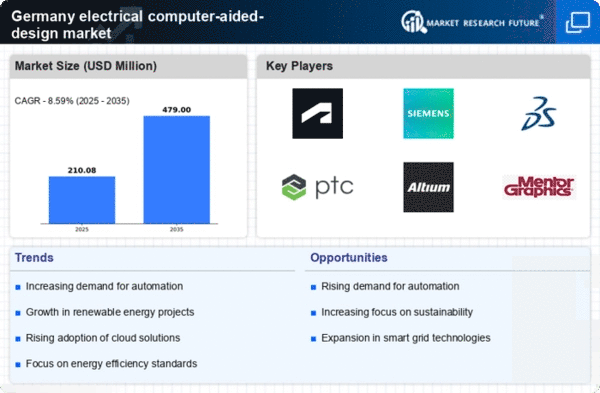Increased Investment in R&D
Investment in research and development (R&D) is a crucial driver for the electrical computer-aided-design market in Germany. Companies are allocating substantial resources to innovate and improve their design capabilities. This focus on R&D is essential for developing cutting-edge tools that can address the evolving needs of various industries. In 2025, the market is projected to grow by 14%, largely due to increased funding for technological advancements. This trend suggests that organizations are prioritizing innovation as a means to enhance their competitive edge, ultimately leading to more efficient and effective design processes in the electrical sector.
Growing Demand for Customization
Customization is becoming a pivotal driver in the electrical computer-aided-design market in Germany. As industries evolve, the need for tailored solutions that meet specific client requirements is on the rise. This demand for customization is particularly evident in sectors such as automotive and aerospace, where unique design specifications are crucial. Companies are leveraging electrical CAD tools to create bespoke designs that enhance functionality and performance. The market is expected to witness a growth rate of around 12% in the coming years, as businesses prioritize personalized solutions. This trend underscores the importance of flexibility and adaptability in design processes, which are essential for meeting diverse customer needs.
Collaboration and Interoperability
Collaboration and interoperability among different design platforms are emerging as key drivers in the electrical computer-aided-design market in Germany. As projects become more complex, the need for seamless integration between various software tools is paramount. This trend is fostering partnerships between software providers and users, enabling more efficient workflows and improved communication. The market is expected to grow by approximately 11% as companies seek solutions that facilitate collaboration across teams and disciplines. This emphasis on interoperability indicates a shift towards more integrated design environments, which could enhance productivity and innovation in the electrical design industry.
Regulatory Compliance and Standards
The electrical computer-aided-design market in Germany is significantly influenced by stringent regulatory compliance and industry standards. As regulations become more complex, companies are compelled to adopt CAD tools that ensure adherence to safety and quality standards. This necessity drives the demand for advanced design software that can facilitate compliance checks and documentation. In 2025, it is anticipated that the market will expand by 10% as organizations increasingly recognize the importance of integrating compliance features into their design processes. This trend highlights the critical role of CAD tools in navigating regulatory landscapes, thereby enhancing operational efficiency and reducing risks associated with non-compliance.
Technological Advancements in Software
The electrical computer-aided-design market in Germany is experiencing a surge due to rapid technological advancements in software solutions. Innovations in design tools, such as enhanced simulation capabilities and improved user interfaces, are driving demand. The integration of advanced algorithms and machine learning techniques allows for more efficient design processes, reducing time and costs. As a result, companies are increasingly investing in these technologies to stay competitive. In 2025, the market is projected to grow by approximately 15%, reflecting the increasing reliance on sophisticated software tools. This trend indicates a shift towards more automated and intelligent design processes, which could reshape the landscape of the electrical design industry.
















